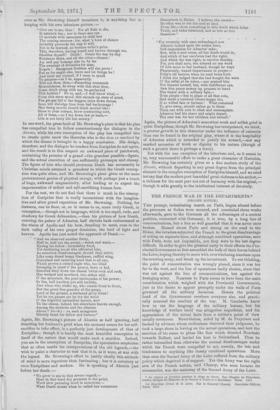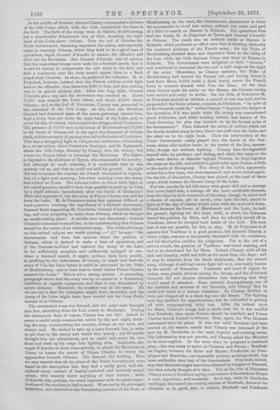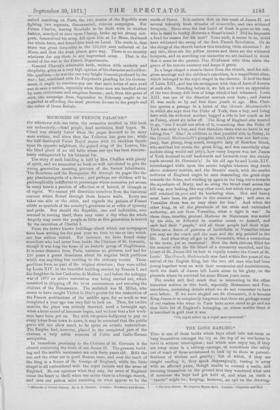THE FRENCH WAR IN TILE DEPARTMENTS.* [SECOND NOTICE.] THE prompt,
unhesitating march on Paris, begun almost before the prisoners at Sadan were secured, and concluded three weeks
afterwards, gave to the Germans all the advantages of a central position, connected with Germany, it is true, by a long line of communications, but a lino so well guarded that it was never once broken. Massed about Paris and strong on the road to the Rhine, the invaders subjected the French to the great disadvantage of acting on separate lines, and although combined operations, save with Paris, were not impossible, yet they were to the last degree difficult. In order to give the greatest unity to their efforts the Pro- vincial Government at first assembled the bulk of their forces behind the Loire, hoping thereby to move with overwhelming numbers upon the covering army, and break up the investment. To our thinking, the point of concentration was wrongly placed, since it was too far to the west, and the line of operations badly chosen, since that was not against the line of communications, but against the besieging army. Nearness to Paris seems to have been the main consideration which weighed with the Provincial Government, just as the desire to appear promptly under the walls of Paris governed all the military decisions. Herein the political head of the Government overbore everyone else, and practi- cally assumed the conduct of the war. M. Gambetta knew how to use the language of the military bureau, but his knowledge of warfare itself was altogether superficial, and his appreciation of the actual facts from a soldier's point of view usually erroneous. Nevertheless, aided by M. de Freycinet and backed by advisors whose enthusiasm obscured their judgment, he took a large share in forcing on the actual operations, and lent the sanction of his name to plans like that which directed Bourbaki towards Belfort, and landed his host in Switzerland. Thus he rather intensified than otherwise the normal disadvantages under which the French were compelled to act, namely, the lets and hindrances to anything like closely combined operations. More than once the Second Army of the Loire suffered from the military policy which deprived it of support. Yet this Army was the right arm of the French nation, and Chanzy, who soon became ita commander, was the mainstay of the Second Army of the Loire.
* La allow en Province pendant le Siege de Paris. Par Charles do Froyoinetp alnico d616Etu6 du Ministre de la Guerra h Tours et it Bordeaux. Paris. WI.
La Deuxieme Armee de la Loire. Par le GdaraP Chanzy. Douxitmo Edition. Paris. 1871. In the middle of October, General Chauzy commanded a division of the 16th Corps which, with the 15th, constituted the force in the field. The bulk of the troops were at Salbris, 90,000 strong, but a considerable detachment was at Gien, watching the right bank of the Loirssabove Orleans. Near the end of October the Tours Government, becoming impatient for action, and especially eager to reoccupy Orleans, which they held to be a good base of operations, urged General d'Aurelle to assume the offensive and drive out the Bavarians. But General d'Aurelle was of opinion that the improvised troops were unfit for a forward march, that it would be unwise to compromise the sole army in the field, and that a movement over the river would expose them to a flank attack from Chartres. In short, he preferred the defensive. M. de Freycinet, however, insisted that the French soldiers would fight beat on the offensive, that there was little to fear, and that nothing was to be gained without risk. After two long talks, General d'Aurelle gave way and the movement was resolved on. About 70,000 men crossed the Loire below, and about 25,000 above Orleans ; and on the 2nd of November, Chanzy was promoted to the command of the 16th Corps. At this time the Bavarian General had discerned signs of the storm gathering around him, kept a sharp look-out down the right bank of the Loire, and, to cover his line of retreat, had occupied the villages about Coulmiers. The presence of 70,000 men in the forest of Marchenoir and 25,000 in the forest of Orleans led to the rapid abandonment of Orleans itself, and the necessity of gaining time led to the battle of Coulmiers. This was a straggling fight in villages and enclosures, culminating in a severe action about Coulmiers, Gemigny, and St. Sigh:atom], where the 16th Corps, directed by Chanzy, won the victory, but where the French failed to intercept the Bavarians. The failure is imputed to the slackness of Royal', who commanded the cavalry ; but although he made mistakes, it is undeniable that he was :severely cut up, and that he could not hold his ground. As night did not terminate the combat, the French bivouacked in expecta- tion of a fight next morning ; but when morning Caine the enemy had retired on Tours. The volumes before us throw little light on the vexed question, would it have been possible to push up to Paris by a rapid advance immediately after the battle of Coulmiers? Metz had capitulated, but the army of Prince Charles was still far rfrom the Loire. M. de Freycinet states that opinions differed at head-quarters touching the expediency of a forward movement ; General Borel supporting.M. Gambetta, General d'Aurelle object- ing, and even proposing to retire from Orleans, which he thought an unsafe resting-place I A middle term was discovered ; General d'Aurelle consented to stand fast, on the understanding that Orleans should be the centre of an entrenched camp. The words of Chanzy on this critical subject are worth quoting :—" If," he says, " the Government had been less anxious about the position of Orleans, which it desired to make a base of operations, and if the General-in-Chief had believed the Army of the Loire to be sufficiently complete and sufficiently equipped to con- tinue a forward march, it might, perhaps, have been possible, in profiting by the enthusiasm of victory, to reach and beat the army of Von der Tann before it could be succoured by the Duke of Mecklenburg ; and to beat that in detail before Prince Charles reached the Loire." This is not a strong opinion. A succeeding paragraph shows that the army was by no means in a flourishing condition as regards equipment, and that it was diminished by severe sickness. Moreover, the weather was of the worst. All we can say is that the enterprise might have succeeded, and the Army of the Loire might have been routed not far from Paris, instead of at Orleans.
The entrenched camp was formed, and six corps were brought into line, stretching from the Loir nearly to Montargis. During the subsequent days of repose, Chanzy was not idle ; indeed he seems a model corps commander, active by day and night, study- ing the map, reconnoitring the country, always on the alert, and always cool. Ile wished to take up a more forward line, in order to get close to the enemy and watch him keenly ; but D'Aurelle thought him too adventurous, and he could only scour his own mfront and work up his corps into fighting trim. Gambetta also urged D'Aurelle to show some activity, to attack the Bavarians at Tours, to harass the march of Prince Charles, to sweep the approaches towards Orleans. The General did nothing. Here we may remark that all the plans of the Tours Government were based on the assumption that they had a really good, well-dis- ciplined army, instead of hastily-collected and variously-armed troops, who scarcely knew anything of their leaders ; while D'Aurelle was, perhaps, too much impressed with the great imper- fections of the machine he had to work. Worn out by his prolonged hesitation, and alarmed at the threatening marches of the Duke of Mecklenburg in the west, the Government, determined to force the commander-in-chief into action, ordered two corps and part of a third to march on Beaune la Rolando. The operations thus had two heads, M. de Freycinet at Tours and General d'Aurelle at Orleans. The result was an isolated battle at Beaune In Rolande, which produced no effect save that of showing distinctly the scattered positions of the French army ; for the Duke of Mecklenburg touched them and disquieted them in the valley of the Loir, while the 10th German Corps met them at Beaune la Rolande. The Government were delighted at their " success," and continued to command the two and a half corps on the right of the army. Meantime, as Chaim, narrates, the Duke of Mecklenburg had turned the French left, and having forced it back from Mord, boldly made a flank march across the French front to connect himself with Von der Tann. At the time when Ducrot made his sortie on the Marne, the German armies were united and ready to strike. On time 30th of November M. de Freycinet arrived at Orleans, a council of war was held, and he propounded the Tours scheme, a march on Pithiviers. " In spite of all the Generals could do," writes Chanzy, " to prove the danger of the operation, if it was made when the enemy was concentrated about Pithiviers, and while nothing certain was known of the Paris diversion, the plan was insisted on by the formal order of the Government." Then followed the series of actions which cut the double-headed army in two, threw one-half over the Loire and the other on to its right bank. Thus the intervention of the Tours Government really played into the hands of the Ger- mans, whose able leaders broke in the centre of the line, success- fully, though not without fighting. Chauzy here distinguished himself alike by prudence and daring, and while the corps on the right were driven in disorder beyond Vierzon, he kept together the corps on the left, and retired in good order upon Josnes, a little to the north of Beaugency. The Army of the Loire, apparently united for a few days, was thus separated, and never united again. On the 6th of December, Chanzy was placed at the head of three corps, which became the Second Army of the Loire.
For two months he led this army with great skill and a courage that never failed him, a courage all the more creditable because, from the time he took command of his army, though he never had a chance of success, yet he never, even unto the last, ceased to Light as if the day ,of victory would come with the morrow's dawn. Posted between the forest of Marchenoir and the Loire, he held his ground, fighting for five days, until, in short, the Germans turned his position by Blois, and then he adroitly moved off to Vendome, where be occupied both banks of the Loir. Yet even here it was not possible for him to stay. M. de Freycinet is of opinion that Venddine is a good position, but General Chanzy, a better judge, was not so favourably impressed with its excellence, and his description justifies his judgment. Put to the test of a serious attack, the position of VenclOme was found wanting, and had to be abandoned for Le Mans. Indeed, Chanzy, with all his skill and tenacity, could not hold on for more than two days ; and it may be inferred, from his frank statements, that the second army, although it still had much tight left in it, was really beaten by the middle of December. Lassitude and want of vigour, he writes, were, plainly obvious among the troops, and the divisional Generals did not deceive themselves into believing that they would stand if attacked. Even Admiral Jauriguiberry, one of the hardiest and stoutest of the Generals, told Chauzy that he could not count on a serious resistance. So Chanzy decided at once, and slipped off in a thick fog over the Braye. The fighting next day justified his apprehensions, but he succeeded in getting off with comparatively little loss. After the retreat upon Le Mans, Chansy's troops had a short rest, for it was needful that Bourbaki, then about Nevers, should be watched, end Prince Charles betook himself to Orleans. Here, again, the War Minister intervened with his plans. It was not until Bourbaki had been started on his eastern march that Chanzy was informed of the fact by M. Gambetta in the most hopeful and exulting terms. The information was not precise, and Clumsy asked the Minister to be more explicit. At the same time, be proposed a combined plan,—his own army to move on Chartres and Evreux ; Bourbaki on Nogent, between the Seine and Marne ; Faidherbe on Com- piegne and Beauvais,—au impossible project, as things stood, but more soldierlike than that of the Government. Freycinet, indeed, says that Bourbaki might have been directed by Langres or Frouard, but that nobody thought of it then. Yet on the 21st of December Chanzy wrote to Bordeaux saying a movement of Bourbaki on Troyes is easy, opportune, and necessary. As it was, while M. Gambetta exultingly discounted the coining success of Bourbaki, declared the situation to be good, saw, in visions, Bourbaki and Faidherbe
united marching on Paris, the two armies of the Republic were fighting two separate, disconnected, ruinous campaigns. For Prince Charles, leaving Bourbaki to be dealt with in another .fashion, marched at once upon Chanzy, broke up his strong out- posts, demoralized his army, fell upon him at Le Mans, shattered the whole force, and forced him back on Laval. The truth is, that there was great inequality in the 130,000 men collected at Le Mans, and that the weak places gave way. There is no security whatever for any State in any improvised army. That is the moral of the war in the French Departments.
General Chauzy's admirable book, written with modesty and simplicity, gives us a very high opinion of his character and aoldier- . like qualities,--he was the one very bright General produced by the war ; but, combiued with De Freycinet's pleading for his Govern- ment, it ought to convince any one that mere levies of men avail not to save a nation, especially when those men are bandied about by mere enthusiasm and sanguine fancies ; and, from this point of view, the campaign from September to February ought to be regarded as affording the most precious lesions to the people and the rulers of Great Britain.
































 Previous page
Previous page